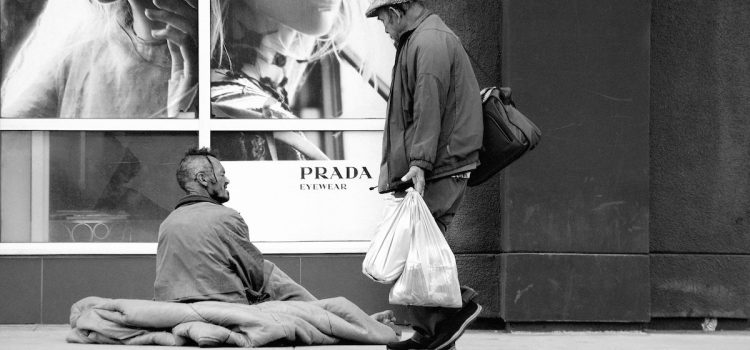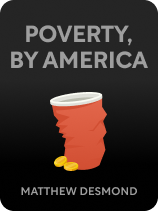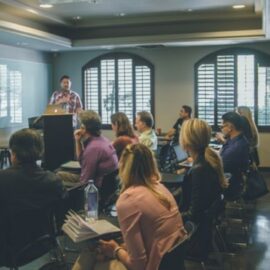

This article is an excerpt from the Shortform book guide to "Poverty, by America" by Matthew Desmond. Shortform has the world's best summaries and analyses of books you should be reading.
Like this article? Sign up for a free trial here.
Why are some people poor? Are they keeping themselves down, or are they victims of others who don’t want them to succeed?
In Poverty, by America, social scientist Matthew Desmond explores how and why the commonly cited explanations for poverty fall flat. Then he turns his attention to what he believes does explain the persistence of poverty in America.
Read on to learn why Desmond thinks the exploitation of the poor is a reality in the US.
Exploitation of the Poor
Desmond writes that the primary force perpetuating poverty is the non-poor Americans who benefit from keeping their fellow Americans poor. According to Desmond, it’s a story of appropriation and exploitation of the poor, where choices made by individuals and society at large contribute to the immiseration of millions.
| Does Wealth Cause Poverty? Desmond argues that the wealth of some Americans comes at the expense of the poverty of others. But is this analysis oversimplified? Some argue that the true relationship between wealth and poverty is more complicated. According to this argument, increased wealth among the world’s richest individuals does not necessarily come at the expense of the poor: As the super-rich accumulate wealth, it’s often a result of creating new businesses, innovations, and jobs that can help alleviate poverty. Notably, there’s a distinction between wealth created through innovation and entrepreneurial activities and wealth accumulated through exploitation and corruption. While there’s a problem with wealth inequality in cases of crony capitalism or economic rent-seeking, critics of the “wealth causes poverty” argument say that attacking the existence of wealth itself is misguided. Instead, the focus should be on addressing the root causes of poverty, such as corruption, lack of access to education and healthcare, and barriers to economic opportunity. |
We’ll explore the choices we make to create the poverty of others, including our demands as consumers for cheap goods and convenient services, how and where we invest our money, and where we choose to live. We’ll also explore some of the more specific modes of exploitation, including rent gouging by unscrupulous landlords, the predatory shadow banking system, and housing discrimination.
#1: The Consequences of Our Consumer Choices
Desmond writes that the choices we make as consumers contribute to the poverty of others.
Many of these choices are related to our demands for cheap goods and our expectations of instantaneous service and deliveries of those goods. The low prices and same-day deliveries offered by e-commerce giants like Amazon or food delivery services like Seamless aren’t possible solely because of technological innovation. Rather, writes Desmond, behind these conveniences is a vast underclass of underpaid drivers, exploited kitchen workers, and un-unionized warehouse employees. Their poverty and exploitation are the hidden costs of our material comfort.
| Are Consumers Willing to Pay More for Products Made Under Fair Labor Conditions? Although Desmond asserts that consumer demand for cheap goods fuels labor exploitation, some research suggests that there is a substantial demand for products made under fair labor conditions. Many consumers are willing to pay a premium for such products. However, this demand is not uniform across all consumers but is influenced by various factors, including income, education, and political ideology. Consumers with higher incomes, more education, and left-leaning political views are more likely to value fair labor practices and express a willingness to pay extra for ethically produced goods. Further, preferences for fair labor practices have a more significant impact on certain industries, such as clothing and electronics, which are more labor-intensive and likely to face labor rights concerns. |
#2: Investment Decisions and Privilege
According to Desmond, we also contribute to poverty through our investment decisions.
The most profitable companies to invest in and buy stock in are often those that boost their profit margins by keeping workers underpaid, without union representation, and laboring under poor and unsafe conditions. When you invest in those companies—whether you’re an active stock trader or are just passively and indirectly investing in them through a retirement account like a 401k—you’re both rewarding those companies for exploiting their workers and profiting off that exploitation.
| Does It Make a Difference to Divest From Irresponsible Corporations? Although Desmond chastises individuals for investing in companies that exploit their labor forces, some scholars contend that divestment campaigns, wherein individual shareholders dump the stock of such companies, have little effect on those companies’ financial performance. In some cases, it may even benefit them, as other investors who don’t share the same concerns may see an opportunity to buy undervalued shares—potentially stabilizing or even increasing the stock price. These critics write that divestment is often a form of symbolic protest and moral expression, and the actual economic consequences for the targeted companies can be limited. Instead, shareholder engagement can be an alternative strategy to divestment, where investors use their leverage as shareholders to engage with companies to encourage positive change in their practices. This approach can be more effective in driving sustainable corporate change. |
#3: Keeping the Poor Out of Our Neighborhoods
Desmond writes that the places we choose to live and the local housing rules we make are powerful contributors to entrenched poverty.
Wealthier neighborhoods often pass zoning laws that prohibit the construction of multi-family houses and apartment buildings. Because these latter types of homes tend to be more affordable, these policies have the effect of locking poor people out of more affluent neighborhoods—trapping them in poor communities with generational poverty.
These policies also keep the supply of available and affordable housing low. This means they raise the cost of housing and protect the real estate investments of incumbent homeowners—another way that our lifestyle choices increase our material comfort at the expense of the poor.
Rents and Landlords
Desmond writes that one effect of these exclusionary zoning policies is to pack poor people—who are disproportionately Black and Latino—into pockets of poverty, often in urban slums. And those urban slums are often a gold mine for landlords who charge higher rents for dilapidated buildings and apartments compared to those in more affluent neighborhoods.
This is because landlords can extract every dollar out of old and inadequate housing stock by dividing them into smaller and smaller apartments for people who have no other option of where to live. The desperation and disempowerment of their tenants is what allows landlords to gouge them this way. Indeed, writes Desmond, in many parts of America it’s more profitable to be a landlord in a poor neighborhood than in a wealthy one. The situation has only gotten worse since 2000, with median rent increasing more than two and a half times—far outpacing inflation and the meager wage increases over that time.
#4: The Shadow Banking System
Another way that the economic system preys on the poor is through the system of “shadow banking.” According to Desmond, many individuals experiencing poverty find themselves locked out of the traditional banking system because they lack credit or proper paperwork to open accounts. Consequently, shadow banking options, like payday lenders and check cashers, step in to fill the void. They charge exorbitant rates and fees, effectively taking around $61 million in such fees per day from the poorest Americans. Desmond writes that this essentially amounts to the theft of labor.
And, he notes, it’s a self-reinforcing cycle. The bad credit that comes from poverty forces people to rely more on fringe banking options, whose ruinous interest charges drive them even further into poverty. All of this creates a lucrative industry for the lenders.
| The Case for Payday Lenders Although Desmond decries the practices of payday lenders and other financial services that operate separately from mainstream financial institutions, some writers contend that they are a vital lifeline for working and poor people. In Hillbilly Elegy, JD Vance—who went on to become a US Senator—writes that during his undergraduate years, while working for a state legislator at the Ohio state capitol, he came to share his boss’s conservative political views. In particular, they had a shared opposition to a bill to curb payday lending practices. Vance writes that his boss was one of the few legislators to oppose the measure.Vance recalls that he had occasionally relied on payday loans to cover basic expenses, as had many people in his community. He writes that without them, such people would have overdrawn their bank accounts and faced potentially worse financial consequences than the interest from the loans. For him, the problem was that well-meaning politicians were pushing measures that would actually harm the very people they were intended to help. In examining his political evolution, Vance sees the anti-payday lending bill as an experience that cemented his commitment to free-market conservatism and his rejection of well-meaning but ultimately misguided welfare state liberalism. |
Exercise: Understand Your Role in Perpetuating Poverty
Explore how your choices as a citizen, voter, and consumer may contribute to the continuation of poverty.
- What are the key factors that Matthew Desmond discusses in the book as contributors to poverty in America, and how do you think these factors manifest in your life or community? Explain your answer. (For example, you can reflect on whether you or people in your community have experienced housing insecurity, such as frequent moves or difficulty paying rent.)
- In what ways do housing policies, as described in the book, perpetuate poverty, and what role do you believe you play in advocating for changes in such policies? (For example, you might reflect on whether you can support or participate in efforts to combat housing discrimination and promote fair housing practices.)
- The book highlights the struggles faced by individuals living in poverty. How do you think you can engage with these individuals? What specific actions might you take? (For example, you might consider volunteering your time and skills to local organizations that support low-income individuals and families. This could involve working at food banks, homeless shelters, or literacy programs.)
- The cycle of poverty often involves limited access to education and job opportunities. How can you support education and job training initiatives that help individuals break free from poverty? (For example, you might offer your time to mentor or tutor individuals seeking to improve their education. This could include helping with homework, providing career advice, or assisting with resume-building and interview skills.)

———End of Preview———
Like what you just read? Read the rest of the world's best book summary and analysis of Matthew Desmond's "Poverty, by America" at Shortform.
Here's what you'll find in our full Poverty, by America summary:
- Why the United States suffers from so much poverty and inequality
- How some Americans benefit from the poverty of others
- How we can empower the poor and eradicate poverty






